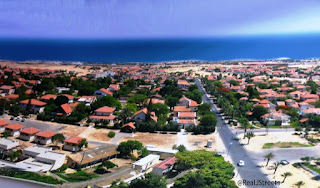GUSH KATIF - II
GUSH KATIF – II
Gush Katif – 10 years old
Since Gush Katif was planned as a strategic buffer
between Israel and Egypt, people were given incentives to join and were offered
a small house (not yet built) and a greenhouse. Ganei Tal, which Simcha (my
first-born) and her husband, Gideon, decided to join, was the second moshav to
be built there.
Since the
houses had not yet been built the other members, who were all married and lived
elsewhere, had to leave their families in their homes at the beginning and
lived together as bachelors in one building, in order to be able to start work
in their greenhouses.
Simcha and
Gideon, who were newly-weds, started their married life living in an old caravan
and turned it into a home - although Gideon was so tall that his feet stuck out
of the “bedroom” window! Their next “home” was an old bus from the time of the
British mandate which Gideon shlepped from the Tel-Aviv old bus station. There
was still a notice stuck up from that time “beware of pickpockets”. Since Gideon
had “golden hands” he devised a shower stall and toilet and Simcha hung
curtains in the “bedroom”.
When they
finally moved into their permanent two-bedroom home it was just in time for
their oldest boy Nir to be born. Two years later their one daughter, Ya’ara,
joined the family and then came Omer three years later. After Omer there was a
break of six and a half years until Assaf and then Gilead who is the youngest
was born.
Gideon
Rivlin, a ninth generation Israeli, was a devoted husband and family man and
worked very hard to improve their standard of living. Apart from his
greenhouses, where he grew flowers and red peppers for export, his main source
of income was erecting and fixing fences around settlements all over the
country for defense purposes. Some of the places in which he worked were
exposed to enemy fire which was a great source of concern for all of us.
Although
the Gush Katif settlements and the roads leading to it were guarded by
the Israeli
Army's Gaza Division,
settlers were still vulnerable to attacks.
During
the First Intifada (1987–1990),
which broke out in nearby Gaza, the residents of Gush Katif were on the
forefront of the violence and were subject to frequent stoning of traffic,
among other incidents.
Since
the beginning of the al-Aqsa Intifada (2000),
Gush Katif settlements were the target of thousands of violent attacks by
Palestinian militants. More than 6000 mortar bombs
and Qassam rockets were
launched into Gush Katif, miraculously causing only few fatalities though causing
tremendous property and psychological damage. Most of the ground attacks
were infiltrations and
shootings. There were also attempts to infiltrate by sea.
Palestinian
attacks on Israeli vehicles traveling on the Kissufim road were very common. A school bus was
bombed on 20 November 2000, killing two teachers and injuring several
children. Three children from one family lost their legs in the attack. In another
attack, in May 2004, Palestinian militants ambushed and killed Tali Hatuel,
who was eight months pregnant, and her four daughters when a Palestinian
terrorist opened direct fire on her car.
Two soldiers who came to her assistance were also shot. Many
of the ground attacks on Gush Katif were thwarted by the Israeli military.
All
in all, 42 residents of Gush Katif were killed by Arab terror and countless
others injured.



Comments
Post a Comment